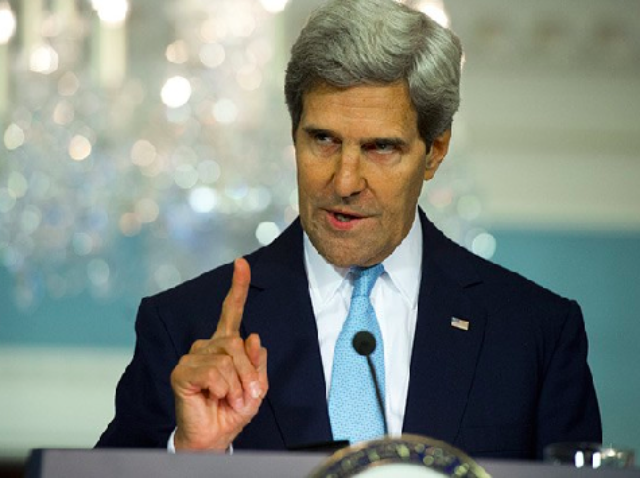Climate change and a growing world population will make staving off world hunger more difficult in the future, Secretary of State John Kerry told an audience convened for a panel on “Resilience and Food Security in a Changing Climate” at the U.S. Africa Leaders Summit Monday.
According to Kerry, 8,000 children die every day because they do not have enough to eat.
“Eight-thousand children every single day,” Kerry stressed. “Around the world, one in eight people suffers from chronic hunger, and in sub-Sahara Africa that number regrettably is one in four. So looking to the future, it’s only going to be more difficult to bring these numbers down.”
The secretary of state explained that the increased difficulty will stem from a quickly growing world population — he said that the seven billion people the world struggles to feed today will be nine billion by 2050 — more than half of which, Kerry continued, is set to occur in Africa.
Kerry said that climate change will make confronting world hunger even harder.
“On top of that, the growing impact of climate change is going to put extraordinary stress on our ability to be able to produce the amount of food that we need to be able to feed those increasing numbers,” he said.
The former Democratic Massachusetts senator stressed that the effects of climate change are already being felt around the world:
We’re not talking about some distant future. We’re not talking about some pie in the sky, unproven set of theories, as they were in the earliest days of population growth or other challenges that we face. The impacts of climate change are already being felt everywhere in the world. From the Arctic to the Antarctic, and everywhere in between and around, and they are only going to get worse,” he said, noting that will continue to be the case unless world leaders are able to reach an agreement in Paris next year at the UN conference on climate change.
“All you have to do is look at the extreme conditions that farmers are dealing with around the word. Hotter temperatures, longer draughts –like in California for our instance and other parts of the world — unpredictable rainfall patterns,” Kerry continued highlighting Delhi, India’s torrential rains. “Intense wildfires and you can run the list, I’m not going to run it today.”
According to Kerry, the world must ask what will happen due to the effects of climate change.
“All you have to do is look at our ocean, the same carbon pollution that drives climate change is literally changing the ocean’s chemistry,” he said, arguing that it is among the difficulties fish populations are facing.
Kerry went on to say that the increase in carbon is not only detrimental to the amount of food available, but it is also making what is available less nutritious.
“The intersection between climate change and food is not just about quantity. We’re now seeing carbon pollution making some of the food we do grow less nutritious than it used to be,” Kerry said, calling the loss of nutrients a “hidden hunger.”
Kerry called for a focus on the impact of “food security” and climate change now, while looking for ways to cut the release of carbon, and he announced that the United States expects to formally sign onto the Global Alliance for Climate-Smart Agriculture. He further encouraged other nations to join as well, when the United Nations is expected to launch the initiative this September in New York.
“I know that several other African countries here are prepared to make similar announcements, and we are working together to produce a declaration announcing our mutual intent to join this effort,” he added.

COMMENTS
Please let us know if you're having issues with commenting.